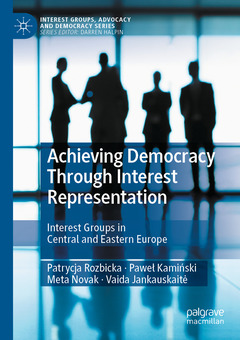Description
Achieving Democracy Through Interest Representation, 1st ed. 2021
Interest Groups in Central and Eastern Europe
Interest Groups, Advocacy and Democracy Series
Authors: Rozbicka Patrycja, Kamiński Paweł, Novak Meta, Jankauskaitė Vaida
Language: English
Subject for Achieving Democracy Through Interest Representation:
79.11 €
In Print (Delivery period: 15 days).
Add to cartPublication date: 10-2021
225 p. · 14.8x21 cm · Paperback
79.11 €
In Print (Delivery period: 15 days).
Add to cartPublication date: 10-2020
225 p. · 14.8x21 cm · Hardback
Description
/li>Contents
/li>Biography
/li>Comment
/li>
Chapter 1: Introduction.- Chapter 2: Interest organizations in Central and Eastern Europe – evaluating population ecology.- Chapter 3: Organized interest in the policy-making process.- Chapter 4: Drivers behind relations between interest organizations and political parties in the CEE countries.- Chapter 5: The organizational development of non-governmental organizations in CEE.- Chapter 6: Significance of trade unions in the CEE counties - beyond corporatism and pluralism?.- Chapter 7: Seeking access to policy stakeholders: business ‘lobbying’ vs others.- Chapter 8: Interest organizations in CEE and European policy process.- Chapter 9: Conclusions. The future of ‘lobbying’ in the CEE countries.




